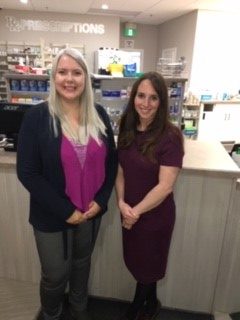
Susanne Nicolay (right) and her colleague Vicky Schultz.
An exciting new testing initiative in Saskatchewan hit the headlines last month, as local news reported that the clientele of the Queen City Wellness Pharmacy in the city of Regina would be able to access rapid, one-minute HIV testing as part of a new study. We spoke to one of the driving forces behind the project, Susanne Nicolay, Clinic and Project Coordinator with Wellness Wheel, to learn more. Wellness Wheel is a non-profit health care organization that seeks to increase access to care for chronic diseases, including HIV, in Saskatchewan.
“This plan really came out of the fact that Saskatchewan is the national leader in HIV positive rates. We also have the highest rates of HCV [Hepatitis C]and co-infection. We continue to see individuals diagnosed with HIV. Testing is routinely offered here but still, many people are not actually being offered testing, nor is there easy access for HIV testing for everyone,” explained Susanne.
HIV point-of-care testing began in Saskatchewan in 2010. Regina was the first area to use INSTI with the fingerstick method for collecting blood samples. It was and is still primarily offered via public health clinics across the province. Susanne said, “As in many communities, there are people in Regina who struggle with substance abuse, including injection drug use. Pharmacists are well placed to interact with a variety of individuals and are adept at counselling. A community pharmacy was concerned about some individuals not accessing testing for HIV and/or Hepatitis C. On further discussion to find a solution, we realized that these pharmacists could form a vital link from diagnosis to care through rapid HIV testing, especially as they have such regular contact with the community.”
After securing a grant to support the initiative, Susanne and her team worked hard to get the project in place, ensuring that it would meet standards for care and safety, including obtaining local Ethics approval. Supported by Susanne and another nurse, the pharmacy is now routinely offering the option to have an INSTI test to each one of their clients, regardless of any identified or perceived risks. All regular clients accessing the pharmacy are offered an HIV test. For those who consent to testing, a private space is available for confidential counselling and information about HIV and the testing process, followed by the test, which provides instant results. Any reactive point-of-care test results will lead to the person being linked to confirmatory testing. In the event that they are confirmed to have HIV, they are connected to further care and counselling. Those who test non-reactive (negative) can receive information about HIV prevention. Susanne says, “So far we have tested people with a number of different levels of risk. Some people may not have previously been aware of possible risk factors, so the pharmacists have had the opportunity to really open up the conversation around not only HIV but a range of other issues, including Hepatitis C and risk reduction. In some cases, the conversation has stretched into discussions about PrEP and other prevention methods,” she adds. “Overall things are working out really well and the feedback from both pharmacists and their clientele has been really good. It’s a small pharmacy and the staff are really engaged in their community.”

Pharmacists Christie Matechuk and Sarah Kozusko
The results of this inventive new program will be presented at CANAC’s 27th Annual Conference in April and the 28th Annual Canadian Conference on HIV/AIDS Research in May. Whilst not a permanent program, the study could be vital for identifying feasible ways of reaching the undiagnosed and supporting regional and national goals on HIV prevention.




